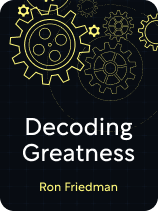

This article is an excerpt from the Shortform book guide to "Decoding Greatness" by Ron Friedman. Shortform has the world's best summaries and analyses of books you should be reading.
Like this article? Sign up for a free trial here.
Do you keep a practice journal? Is your practice too easy or repetitive, or does it stretch you?
In Decoding Greatness, Ron Friedman shares his advice for doing great work—whether that means getting a show at an art gallery, winning a marathon, or nailing a big product pitch. One strategy for improving your performance is effective practice.
Read on to learn how to practice effectively by implementing Friedman’s three recommendations.
Practice Effectively
If you want to get better at something, it makes sense that you’d need to practice. But Friedman argues that it’s easy to practice incorrectly or inefficiently. So, to help you avoid wasting time and effort, he offers three pieces of advice on how to practice effectively.
#1: Reflect on Your Practice
Friedman argues that the most important aspect of effective practice is self-reflection. Keep track of your goals, the practice routines and performance strategies you employ to reach those goals, and your actual performance. Regularly review each of these elements with an active, critical eye to determine which strategies or approaches worked well and which didn’t.
(Shortform note: In addition to helping you review your progress, self-reflection can help you focus your efforts so that you get the most out of your practice time. In The One Thing, Gary Keller recommends that you ask yourself the following focusing question: “What’s the one thing I can do such that by doing it everything else will be easier or unnecessary?” The answer to this question, Keller suggests, will help you hone your practice by uncovering your most impactful course of action.)
Friedman suggests that journaling is an especially good way to reflect on your practice. He specifically recommends five-year journals, which allow you to make entries for the same date for five consecutive years so that you can review where you were at specific points in the past. In the process, you have a chance to notice relevant patterns that might not be obvious on a day-to-day level—for example, you might realize that when you play video games before going to work, you’re more creative at your job.
(Shortform note: If Friedman’s five-year journal suggestion doesn’t appeal to you, there are a number of other journaling and note-taking options that incorporate a similar process of review and reflection. For example, The Bullet Journal Method makes ongoing reflection a core part of its system: The method requires you to transfer your tasks and notes from day to day, month to month, and year to year—in the process, you have the chance to review your accomplishments and setbacks, identify tasks that have become irrelevant, and assess whether you’re on the right track.)
#2: Challenge Yourself
Friedman also argues that for practice to be effective, it needs to be challenging—it should push you past your current comfortable skill level. If practice is too easy or too repetitive, you stop paying attention to what you’re doing, which halts growth and can harm your performance.
(Shortform note: In addition to being necessary for growth, difficult practice goals might also make you feel better about practicing in the first place. Research suggests that people find challenging goals more motivating than easier goals—and that they paradoxically tend to feel more confident they can achieve harder goals than easier ones.)
Similarly, Friedman stresses the importance of mixing up your practice so that you don’t fall into routines. The problem, he says, is that if your practice regimen is the same every time, you get bored: Your brain checks out and you stop learning. To avoid this problem, find new ways to develop the same skills, or add new obstacles and challenges to keep things fresh. For example, if you’re a heavy metal guitarist, you might practice by learning some classical pieces; or, you might challenge yourself to play material you know at a faster-than-normal tempo to make it harder.
(Shortform note: In addition to varying your practice regimen from session to session as Friedman suggests, consider varying the structure of your practice itself. In other words, instead of spending half an hour practicing a difficult passage on the piano over and over again, switch between loosely related activities such as repeating the passage, transposing it to different keys, and improvising variations on it. This approach—known as variable practice—helps you learn better because it forces you to recall the target skills and knowledge more often and in different contexts. That translates to deeper understanding and improved long-term retention.)
#3: Mentally Rehearse
In addition to physical practice, Friedman recommends that you mentally rehearse prior to your actual performance. To do so, he suggests imagining your performance as specifically as you can, including the time and place, the sensory details you expect to encounter, and the nuances of the behaviors you’ll need to perform.
Friedman argues that this kind of imagery can improve your actual performance in several ways:
- It locks down important details.
- It prepares you for the stressors and challenges you’ll likely face.
- It helps you strategize because you’ll foresee potential problems and find ways to avoid or compensate for them.
Friedman cautions that, when using this kind of imagery, it’s important to imagine your performance, not your success—in other words, imagine the specific behaviors you’ll perform in the kitchen, not how good the food will taste or how proud you’ll feel when serving your guests. He points to a study showing that visualizing success actually makes your performance worse. That’s because when you imagine yourself succeeding, you get an emotional payoff that tricks your brain into thinking you have already succeeded. This payoff lowers your motivation and makes you more complacent, which ultimately makes you less effective.

———End of Preview———
Like what you just read? Read the rest of the world's best book summary and analysis of Ron Friedman's "Decoding Greatness" at Shortform.
Here's what you'll find in our full Decoding Greatness summary:
- The secret shortcut to elite performance and creative innovation
- How to reverse engineer someone else's work to create your own
- How to lower the stakes of failure by mitigating your creative risks





